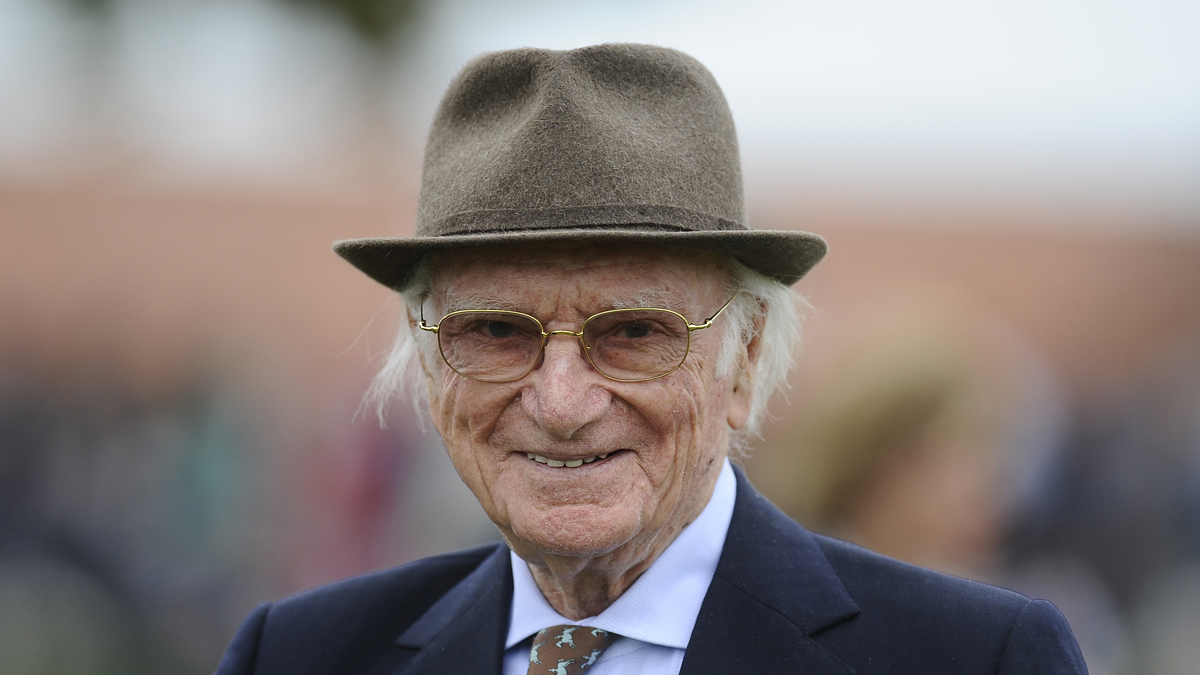Peter O'Sullevan: the 'voice of racing' with U-Boat binoculars
Five things you might not know about the horse racing commentator, who has died aged 97

A free daily email with the biggest news stories of the day – and the best features from TheWeek.com
You are now subscribed
Your newsletter sign-up was successful
Peter O'Sullevan, the former commentator who became known as 'the voice of racing', has died at the age of 97.
He spent 50 years working for the BBC and his measured commentary became synonymous with racing and the Grand National in particular. He also spent 36 years as the Daily Express racing correspondent and worked for the Press Association.
In 1997 he became the first sports commentator to be knighted. Here are five other things you might not know about the Irish born journalist.
The Week
Escape your echo chamber. Get the facts behind the news, plus analysis from multiple perspectives.

Sign up for The Week's Free Newsletters
From our morning news briefing to a weekly Good News Newsletter, get the best of The Week delivered directly to your inbox.
From our morning news briefing to a weekly Good News Newsletter, get the best of The Week delivered directly to your inbox.
He was a sickly child
Raised by his grandparents in Surrey after his parents separated, O'Sullevan went to Charterhouse school and then to a boarding school in Switzerland. As a child, he suffered from asthma, bronchitis and skin problems and Julian Wilson, writing about O'Sullevan for The Guardian before his death in 2014, says O'Sullevan was so self-conscious of his appearance "that for many months he would venture outdoors only during the hours of darkness".
His health problems meant he was ineligible for military service during the Second World War and instead worked for the rescue services in Chelsea. "At that time I wouldn't have taken odds of 100/1 of me reaching 50," he once said in an interview, reports the BBC.
He had U-Boat binoculars
A free daily email with the biggest news stories of the day – and the best features from TheWeek.com
"One of the last of the BBC pioneer broadcasters, O'Sullevan simply was horse racing to generations just as Bill McClaren was rugby union and Dan Maskell tennis," says the Daily Mail. He was a meticulous commentator who prided himself on his accuracy and "delivered his narration from precarious perches at the top of grandstands... relying on his giant binoculars rescued from a German U-Boat".
He used them for most of his career and "was one of the last commentators to switch from binoculars... to a monitor and used to meticulously prepare the day before by colouring in the silks of each horse and annotate his 'racecard'", says the Daily Telegraph.
He liked a flutter
He got the racing bug as a child and in 1928 had a sixpenny each-way bet on Tipperary Tim in the Grand National, reports the BBC. "His small investment paid off handsomely as the horse, at odds of 100/1, went on to win."
He became a "committed punter", says the Daily Mail, and would often scout horses around Europe. He made enough money from betting to own his own horses, and even commentated on them. But he remained objective, and "even as his 'little star', Attivo, galloped to victory in the 1974 Triumph Hurdle, he maintained his steely professionalism", says the BBC.
He was a campaigner
In the 1980s, as a member of the Jockey Club, he campaigned against excessive use of the whip, and also called for the infamous Becher's Brook fence at Aintree to be made safer. After retiring he set up a trust, which "distributed millions to causes close to his heart, mostly involving the aftercare of racehorses and cruelty to animals", says the Mail.
He was a loner
"While O'Sullevan was much admired by fellow journalists, until recent years he had few close friends," says Julian Wilson's obituary in The Guardian. "As a broadcaster he was considered difficult to work with and rarely, if ever, socialised with colleagues."
However, the great and good of the racing fraternity have lined up to pay tribute to the commentator. Jockeys including AP McCoy and Willie Carson led the tributes, and Claire Balding described him as "the ultimate pro and the definition of a gentleman".
-
 The environmental cost of GLP-1s
The environmental cost of GLP-1sThe explainer Producing the drugs is a dirty process
-
 Greenland’s capital becomes ground zero for the country’s diplomatic straits
Greenland’s capital becomes ground zero for the country’s diplomatic straitsIN THE SPOTLIGHT A flurry of new consular activity in Nuuk shows how important Greenland has become to Europeans’ anxiety about American imperialism
-
 ‘This is something that happens all too often’
‘This is something that happens all too often’Instant Opinion Opinion, comment and editorials of the day